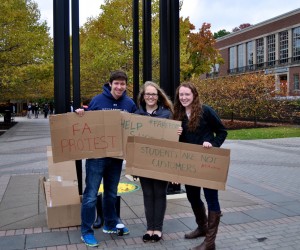The student group Peaceful Protest of the Financial Aid System staged a series of events during Meliora Weekend, including tabling in Wilson Commons and silent protests outside.
The protests were the next phase in the group’s new initiative to spearhead change in the Office of Financial Aid. Their central goals are to foster transparency and communication between Financial Aid and students.
The official schedule of events included tabling in Flag Lounge on Thursday, Oct. 16, a silent protest in Wilson Quadrangle, and another silent protest in the Quadrangle during which protesters were told to wear colored signs corresponding to each student’s amount of debt, difference in financial aid package from last year to this one, the number of friends affected, or their uncertainty as to how they will be affected in the future. The events concluded on Sunday, Oct. 19 with a “photo campaign” in which students walked across campus taking pictures with club members and their respective signs.
“It’s working on how to make [the financial aid system] more transparent, how to make it so that students are able to make smarter, more informed decisions, and how Financial Aid can help us do that as opposed to keeping us in the dark,” Lindsay Wrobel, a member of the organization’s executive board, said of the protests.
Peaceful Protest of the Financial Aid System organized a presentation by Dean of Financial Aid Jonathan Burdick followed by a Q & A session at the Students’ Association (SA) meeting on Monday, Oct. 26. Enough people were in attend. The Gowen room in Wilson Commons was filled with concerned students. The group had met with Burdick the previous Tuesday to discuss their concerns, and they reported on their Facebook page
that the meeting was productive and that Burdick seemed enthusiastic about positive change to the system.
Burdick presented a slideshow about Financial Aid in a Myths, Facts, and Truths format, discrediting the myths and providing data to support the facts. Burdick conceded some of the points of the protesters and members of their Facebook group.
The first myth was that financial aid counselors can hurt you. Burdick stressed that UR financial aid advisors are only there to help. The truth he gave was that there is no four-year counseling. Burdick said he wants to work with Financial Aid to better notify students of their projected tuition packages.
Regarding the counselors, Burdick also addressed students’ protest of the high turnover rate. According to Burdick, Financial Aid has already been working on counselor retention.
The second myth was “college could spend more on aid.” According to Burdick, the University is already near its spending limit, and UR is giving more in aid money than most “elite” schools. The truth he noted was that students are not being warned of individual package “swings.”
The next myth was “the rich and poor are favored.” Burdick said almost everyone has to make sacrifices. The truth he gave was that “pain has grown for ‘middle-class’ students since 2003,” but that this has occurred everywhere, not just at UR. Burdick said that while the Financial Aid formula may seem unfair, it is equally unfair to everyone, inciting laughs from the crowd.
Another myth was the idea that financial aid ignores costs and erases savings. According to Burdick, the formula is researched in depth, and there are four things that matter most in determining packages: parents’ income, secondary real-estate, merit identity, and sports.
Burdick said that, to him, the three most upsetting myths are “bait and switch,” or the idea that students are baited with better packages and then made to pay more once they come—the conception that this is a widespread problem when retention here has risen over the past year; and that appeals to the system are ignored.
He said some upsetting truths were that Financial Aid has lost some student trust, that it has not done everything possible to counsel families, and that they have not acted as leaders in the matter but are rather being led by students. He listed four goals: establishing a permanent student presence in the Office of Financial Aid, four-year planning and early-warning systems for families, reforms to the appeal process, and reduction of counselor turnover.
The room was then open for questions, some of which were taken impromptu from the crowd and some of which were written on slips of paper and sorted according to relevance by SA members.
Peaceful Protest member and sophomore Kelsey Fenner said of the presentation, “I thought it went well […] I was pleased with the turnout and the issues he raised.” Fenner said many of the truths Burdick presented came out of discussion with the group members during the Tuesday meeting. “It seems like our group working with the SA has been able to shed light on areas that had previously been overlooked,” Fenner added. She also noted that the statistics Burdick presented regarding retention of students across years leave some unanswered questions.
Sophomore Nick Mavrelis commented on the event.
“I thought Dean Burdick’s presentation was really well put together. It seemed a little political in the way he answered a few questions, but I think it’s expected,” Mavrelis said. Burdick expressed the desire to continue sharing information with students.
“I think there’s an awful lot more information to give to people, and I hope I can get a chance to do that […] I have a lot of faith in Rochester students.”
McAdams is a member of
the class of 2017.





